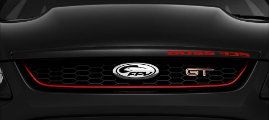http://www.news.com.au/national/m-of-yo ... 6548133045
TAXPAYERS have pumped $42 million into two Ford ''eco'' cars that fail to meet the environmental criteria for some state government fleets.
In a major embarrassment to the Federal Government's ''Green Car Fund for a Greener Future'', the four-cylinder Falcon and the diesel Territory fall outside the purchasing requirements for many state government departments because their emissions are too high or too toxic.
It means the government isn't buying a car that it invested heavily in.
Ford employees bought more than twice as many four-cylinder Falcons than has the government (300 versus 115 cars) - and private buyers have also outspent public office (121 sales), according to confidential figures to the end of November.
Rather than investing to upgrade the cars, Ford is leading the charge to scrap the Green Vehicle Guide star-rating system - the benchmark used by business and government fleets when assessing which cars to buy.
Ford is getting a fraction of the government business compared with its Australian car making rivals Holden and Toyota.
The most recent figures show Ford sold 3300 locally-made cars to state governments across Australia compared with Toyota’s tally of 4100 deliveries and Holden’s order book of 9200 cars.
That's presumably because most of Ford's locally-made models fall below the cut-off as they have higher air pollution ratings.
Ford sold 14,000 Falcons last year; Mitsubishi sold 11,000 sedans in its last full year on sale before its Adelaide factory closed in 2008.
Only one of the three new Fords developed with $42 million taxpayer dollars - the most basic LPG Falcon - earns a high enough rating to make it onto the purchasing lists for some government departments across Australia.
For example, NSW state fleet has a minimum ''pollution'' and ''greenhouse'' score of 13.5 (out of 20) for all but emergency vehicles.
But the four-cylinder Falcon (13 out of 20) and diesel Territory (9 out of 20) don’t make the cut-off. The new LPG Falcon does comply, scoring 15 out of 20.
Government fleets are allowed to buy vehicles below this score, but if they do they won't meet their environmental targets.
Late last year the Federal Government appointed William Angove, the former boss of Ford in Indonesia, to encourage government departments to buy more locally-made cars.
In its submission to Federal authorities, Transport NSW said it has ''concern regarding the proposal to abolish the GVG star ratings system and would encourage the Department of Infrastructure and Transport to reconsider its proposal”.
Sophie Mirabella, the shadow minister for Industry, Innovation and Science, said the proposal to drop the star rating system was another example of the government's ''disastrous ad-hoc approach to green policy and cars.''
''The current scheme was started by our government, and [as with] a lot of policies [the Federal Government] just want to get rid of it for the sake of it,'' Ms Mirabella told News Limited.
The office of Anthony Albanese, the federal minister for Infrastructure and Transport, issued a statement to News Limited: ''The government is considering the feedback received from the community in response to the discussion paper.''
The statement also mistakenly said a number-based rating system would be introduced. It already exists.








